Ever wake up with a pounding headache? It leaves you feeling grouchy and groggy. These morning headaches happen to about 1 in 13 people, causing a rough start to their day. So, what’s the deal with waking up like this? We’ll dive into the reasons and look at how to stop them.
Key Takeaways:
- Sleep disorders, oversleeping, tension, substance use, and certain medications can contribute to morning headaches.
- The hypothalamus and parts of the brain become more responsive during the transition from sleep to wakefulness, making you more susceptible to pain.
- Sleep disorders like sleep apnea, snoring, insomnia, and circadian rhythm disorders are commonly associated with morning headaches.
- Establishing a consistent sleep schedule, managing stress, and avoiding excessive alcohol can help prevent morning headaches.
- If morning headaches persist or worsen, it’s important to consult a healthcare provider.
Sleep Apnea and Morning Headaches
Morning headaches are a tough start to any day. They can leave you feeling grumpy and tired. One big reason for these headaches is sleep apnea. It’s a sleep problem where you might stop breathing for short periods while asleep.
About 29% of people with sleep apnea wake up with headaches. These headaches come with other signs like loud snoring, feeling very tired, and being sleepy during the day. When you stop breathing in your sleep, it messes with how much oxygen your brain gets and how well blood flows. This can lead to waking up with a pounding headache.
Treating sleep apnea could stop those morning headaches and make you sleep better. One way to do this is with CPAP therapy. This treatment involves wearing a special mask over your nose or mouth at night. It helps keep your airways open by blowing air into them. With CPAP, managing sleep apnea means you can say goodbye to those morning headaches.
If you think sleep apnea might be behind your morning headaches, talk to your doctor. They can arrange a sleep study to find out for sure. Then, they’ll help you choose the best treatment to feel better.
Insomnia and Morning Headaches
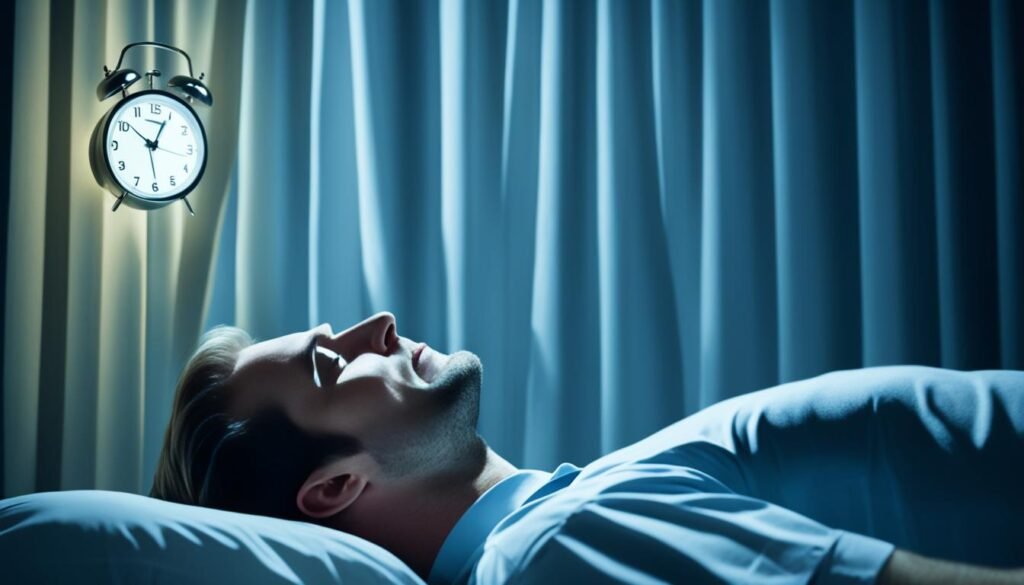
Many people face insomnia, a sleep disorder. It can cause morning headaches. Insomnia makes it hard for people to fall or stay asleep. Therefore, they often feel tired during the day. This leads to headaches, especially in the morning.
To combat insomnia and lessen morning headaches, good sleep habits are crucial. A consistent sleep schedule is a must. Go to bed and wake up at the same time every day, even on weekends. This helps your body’s sleep pattern and improves sleep quality.
It’s also wise to steer clear of caffeine and alcohol near bedtime. They can disrupt your sleep. Regular exercise is key too. It promotes better sleep and can help you dodge morning headaches.
“A consistent sleep schedule, avoiding caffeine and alcohol, exercising regularly, and creating a relaxing bedtime routine can help manage insomnia and reduce morning headaches.”
A relaxing bedtime can cue your body that sleep is coming. This might involve a warm bath, relaxing exercises, reading, or soothing music. By doing these things before bed, those with insomnia can create a sleep-friendly environment and increase their chances of sleeping well.
Reducing stress is extremely important for those with insomnia. Deep breathing, mindfulness, and journaling can ease anxiety. This fosters a peaceful mind, which is good for sleep and keeps morning headaches at bay.
Crucially, tackling insomnia means combining several strategies. This includes healthy sleep habits, cutting down on caffeine and alcohol, exercise, and stress management. By following these steps, individuals can improve the quality of their sleep and deal with insomnia and morning headaches effectively.
Managing Insomnia: Tips for Better Sleep
- Create a consistent sleep schedule, going to bed and waking up at the same time every day.
- Avoid consuming caffeine and alcohol close to bedtime.
- Engage in regular physical exercise during the day.
- Create a relaxing bedtime routine to signal the body to unwind and prepare for sleep.
- Manage stress levels through techniques like deep breathing exercises, mindfulness, and journaling.
Common Strategies for Managing Insomnia and Reducing Morning Headaches
| Strategies | Description |
|---|---|
| Establish a consistent sleep schedule | Going to bed and waking up at the same time every day helps regulate the body’s sleep-wake cycle. |
| Avoid caffeine and alcohol | These substances can interfere with sleep and contribute to insomnia. |
| Engage in regular physical exercise | Regular exercise promotes better sleep quality and reduces insomnia symptoms. |
| Create a relaxing bedtime routine | Engaging in calming activities helps signal the body to unwind and prepare for sleep. |
| Manage stress levels | Stress-reduction techniques can alleviate anxiety and promote a peaceful state of mind for improved sleep. |
Handling insomnia is vital for lessening morning headaches. Applying effective strategies and putting sleep first can significantly boost your well-being. It also helps in keeping morning headaches away.
Circadian Rhythm Disorders and Morning Headaches
Circadian rhythm disorders happen when your body clock gets mixed up with normal sleeping patterns. This mix-up can mess with your sleep, causing not enough rest. This lack of rest can lead to headaches in the morning. Those affected often find it hard to start or stay asleep, or they wake up feeling tired.
One well-known circadian rhythm disorder is delayed sleep phase syndrome (DSPS). Those with DSPS sleep and wake up later than usual. This difference in sleeping times from what society expects can cause morning headaches.
Advanced sleep phase syndrome (ASPS) is another type. People with ASPS go to bed early and wake up early, too. Waking up too early can lead to morning headaches because the body hasn’t had enough rest.
To tackle these rhythm issues and lessen morning headaches, aim for a regular sleep time. Going to sleep and waking up at the same time daily, even on weekends, can help your body’s clock work better. Also, avoid screens before bed. Making your bedroom dark, cool, and quiet supports good sleep and can lower the chances of headaches.
“Sticking to a regular sleep routine is vital for dealing with these disorders and easing morning headaches. Match your sleep cycle to your natural body rhythm for better and more peaceful sleep. This can reduce the pain of morning headaches.”
Teeth Grinding (Bruxism) and Morning Headaches
Teeth grinding, called bruxism, can happen while you sleep. It causes morning headaches. The pressure from grinding your teeth can give you head and face pain. You might not know you grind your teeth at night. But, if you wake up with a headache, jaw ache, or see flattened teeth, it could mean you have bruxism.
There are ways to deal with grinding teeth and stop morning headaches:
- Putting on a mouthguard at night can make you grind your teeth less. This helps lower the pressure on your face and head.
- Getting help for anxiety and stress might stop grinding your teeth. Learning how to manage stress and relax can be helpful.
- Getting good sleep is important. Have a bedtime routine that helps you relax. Make sure your sleeping space is comfy.
- Not smoking, drinking alcohol, or using drugs can help. These things can make teeth grinding worse and cause more morning headaches.
If you practice these tips and deal with the reasons for grinding your teeth, you can feel better. Talk to a dentist or doctor to get more help.
Comparison of Teeth Grinding Management Techniques
| Technique | Description |
|---|---|
| Mouthguard | A custom-fitted dental device that helps protect the teeth and jaw during sleep. |
| Stress Management | Learning coping mechanisms, relaxation techniques, and seeking therapy to reduce anxiety and stress. |
| Sleep Hygiene | Establishing good sleep habits, such as creating a consistent bedtime routine and optimizing the sleep environment. |
| Lifestyle Changes | Avoiding tobacco, alcohol, and recreational drugs that can exacerbate bruxism. |
Oversleeping and Morning Headaches
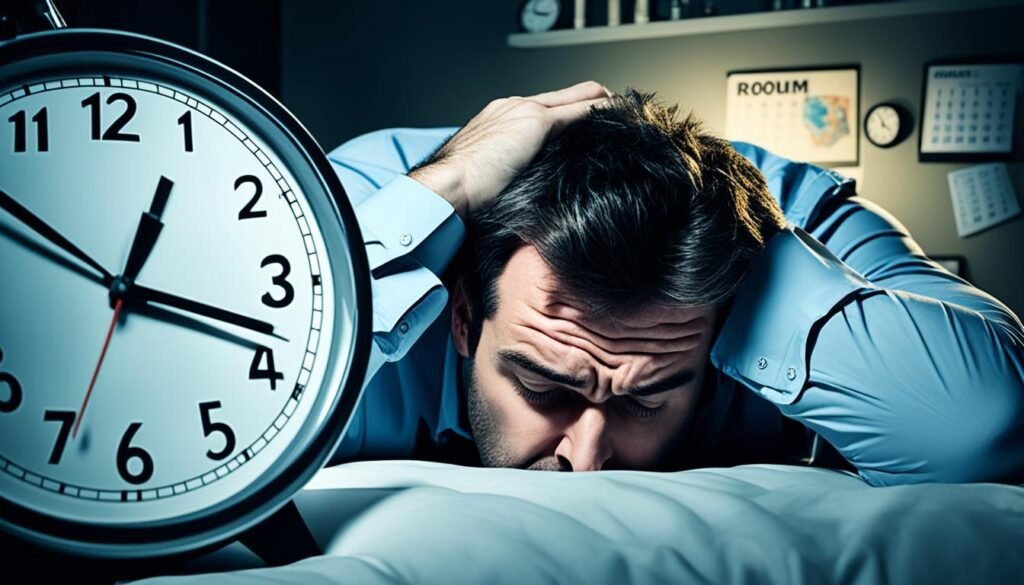
Oversleeping and too much low-quality sleep can cause morning headaches. This happens because it messes with our natural sleep pattern. When we sleep too much, waking up suddenly can be hard on our body. This adjustment challenge can lead to headaches.
To avoid morning headaches caused by oversleeping, try to keep a regular sleep schedule. Aim for enough sleep but don’t overdo it. Go to bed and wake up at the same time every day, even on days off. This routine helps keep your body’s clock in check.
It’s also key to make your sleep space comfy for better rest. Keep your bedroom cool, quiet, and low light. If needed, add blackout curtains, earplugs, or a white noise machine. These tools can improve how you sleep, reducing headaches in the morning.
Stop having caffeine, alcohol, or big meals close to bedtime to steer clear of oversleeping headaches. These can mess with your sleep and up your headache risk. Instead, eat a light dinner and cut back on caffeine in the evenings.
“Maintaining a consistent sleep schedule and creating a sleep-friendly environment are essential in preventing morning headaches caused by oversleeping.”
Promoting Healthy Sleep Habits
Aside from a set sleep routine, boosting your sleep quality is important. There are other good habits that you can add:
- Avoid using screens before bed, as the light can mess with your sleep hormone.
- Regular exercise can better your sleep by keeping your body clock in sync.
- Have a calming bedtime routine, like reading, a bath, or deep breaths, to help you relax.
- Fight stress with relaxation, like meditation or writing, to ease into sleep.
- Your sleep spot matters; a good mattress and pillows, plus a clean, peaceful room, help.
Morning Headache Relief Techniques
If you get a morning headache anyway, try these steps:
- Put a cold or warm cloth on your forehead or neck.
- Drink water to hydrate.
- Relax with deep breaths or muscle exercises.
- Take pain relievers if your doctor says it’s okay.
If morning headaches keep happening, talk to a health pro. They can find what’s causing them and suggest the best way to treat your headaches.
Summary Table
| Potential Causes of Morning Headaches | Prevention Strategies |
|---|---|
| Oversleeping | Maintain a consistent sleep schedule, create a sleep-friendly environment, avoid stimulants and heavy meals before bedtime |
| Low-quality sleep | Follow healthy sleep habits such as avoiding electronic devices before bed, engaging in regular exercise, and managing stress |
| Other factors (sleep disorders, health conditions, etc.) | Consult with a healthcare provider for diagnosis and personalized treatment recommendations |
Migraines and Morning Headaches
Migraines are severe headaches that can be felt on one or both sides of the head. Many people find their migraine symptoms worse in the morning. These morning migraines can get even worse during the day. This can make it hard to do normal activities.
About 12% of Americans deal with migraines. They are more common in women and those with sleep problems. Not getting enough sleep is a big trigger for migraines. This leads to a cycle of headaches and poor sleep.
To manage migraines, knowing your triggers is vital. Each person’s triggers might be different. They could be due to food, hormones, stress, the environment, or sleep issues. Once you know your triggers, you can try to avoid them. This might lessen how often you get migraines or how bad they are.
Identifying Migraine Triggers
Finding your personal migraine triggers is key. Here are some triggers to think about:
- Foods: Foods like aged cheese, chocolate, caffeine, alcohol, and processed meats can be triggers. Keeping a food journal can help pinpoint these.
- Hormonal Changes: Hormonal shifts can trigger migraines, especially in women. This often happens during certain times such as menstruation, pregnancy, and menopause. Keeping track of these changes and your headaches can offer insights.
- Stress and Emotional Factors: Stress and certain emotions can start a migraine. Finding what stresses you, learning to relax, and getting help can reduce headaches.
- Sleep Disturbances: Changes in sleep patterns or lack of sleep can be a trigger. Having a regular sleep schedule and a sleep-friendly bedroom can help prevent headaches.
Managing and avoiding your migraine triggers can lead to a healthier life. This may lower the number of morning headaches you get.
| Methods for Managing Migraines and Morning Headaches | Description |
|---|---|
| Medications | There are many drugs to help with migraines. These include pain relievers, triptans, anti-sickness meds, and meds that stop them before they start. Ask a doctor about which one is best for you. |
| Lifestyle Modifications | Living healthy can help with migraines. Make sure to sleep well, find ways to lower stress, exercise, and eat well. |
| Stress Management | Since stress can cause migraines, it’s important to lower it. Breathing exercises, meditation, and talking to a therapist can help. |
| Trigger Avoidance | Avoiding what triggers your migraines can cut down how often they happen. This might mean changing what you eat, how you sleep, or what you’re exposed to. |
| Keeping a Headache Diary | Writing down when you get migraines can show you patterns. This can help you avoid or manage them better. |
Dealing with migraines takes time and being proactive. By learning what triggers yours, living healthily, and getting the right medical advice, you can make a big difference in how they affect you. This can make your life better.
Alcohol and Morning Headaches

Drinking heavily at night raises your chances of morning headaches. Too much alcohol at night can mess up your sleeping. This affects how well and how long you sleep. Then, you could wake up with a headache.
Alcohol messes with your sleep and can make you dehydrated, a big headache trigger. Drinking alcohol makes you pee more, leading to dehydration. This can be a reason for your morning headache.
It’s smart to drink alcohol responsibly to prevent those morning headaches. Try not to drink a lot, especially late at night. Also, keep yourself hydrated with water in the evening and before bed. Balancing enjoying drinks with looking after yourself can stop those awful morning headaches.
“When consumed in excess, alcohol can disrupt sleep patterns, affecting the quality and duration of your rest.”
Medications and Morning Headaches
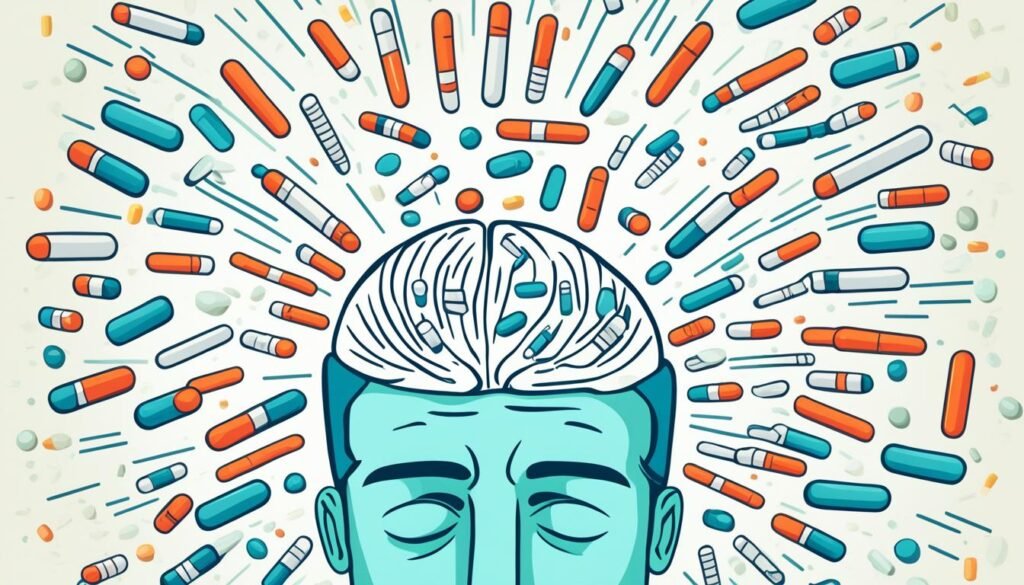
Some over-the-counter and prescription drugs might cause you to wake up with a headache. Many meds can bring on headaches, especially in the morning. Drugs like opioids, triptans, NSAIDs, aspirin, acetaminophen, and anti-anxiety meds are common culprits.
These drugs can mess with your sleep, blood flow, or brain chemistry. This leads to those early morning headaches. Overusing them or suddenly stopping can also start a headache day or night.
If you find yourself with a morning headache due to medications, it’s key to handle it right. Step one is to talk to a healthcare provider. They can check your meds and suggest others that might cause less headache trouble.
Your provider might adjust your meds, change them, or point you to other therapies. It’s vital to do what the doctor says when tweaking your meds. Stopping some suddenly could make things worse. Slow down or switch carefully to help with your morning head pain.
Sometimes, you can’t avoid these headaches if the meds are crucial for your health. If that’s the case, dealing with morning headaches smartly becomes vital. This may mean avoiding things that bring on headaches, like keeping to a good sleep routine, reducing stress, and drinking enough water.
| Medication | Headache-Related Side Effects |
|---|---|
| Opioids | Headache, dizziness, nausea |
| Triptans | Headache, dizziness, fatigue |
| NSAIDs | Headache, stomach upset, drowsiness |
| Aspirin | Headache, upset stomach, heartburn |
| Acetaminophen/Paracetamol | Headache, liver damage (with excessive use) |
| Anti-Anxiety Medications | Headache, drowsiness, dizziness |
Don’t forget, this table only covers a few headache-causing side effects from certain drugs. If you’re worried or have questions about how your meds might affect your morning headaches, always talk to your healthcare provider or pharmacist.
Anxiety and Depression-Related Headaches
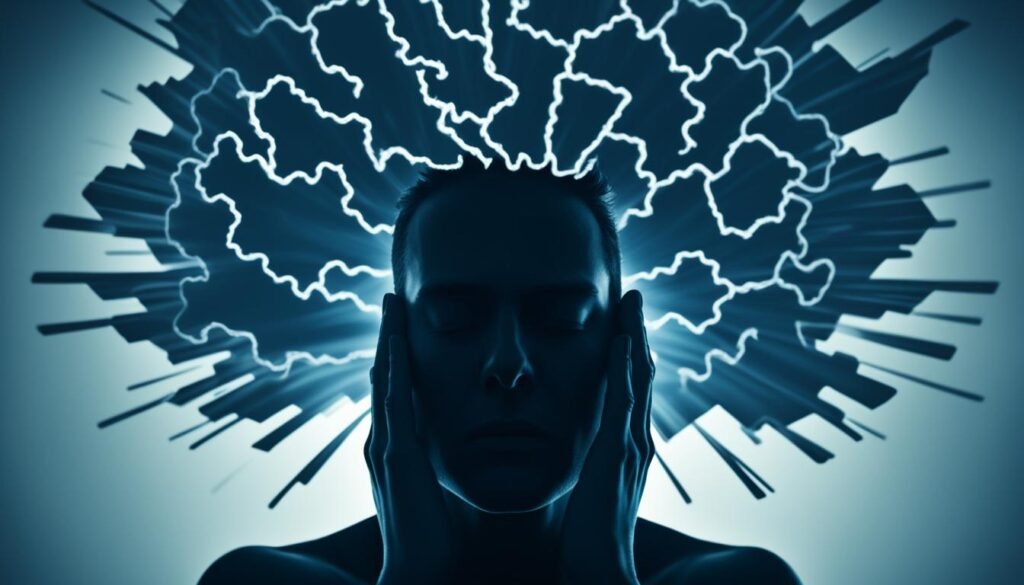
Both anxiety and depression can impact your health. They lead to feelings like sadness or worry. These feelings can also cause headaches.
Headaches often come with anxiety and depression. They might happen at any time. But many people feel them most in the morning. This makes it hard to start the day feeling good.
Anxiety and depression can mess with your sleep. When you don’t sleep well, you might wake up with a headache. Also, these conditions can make your muscles tense, especially in your head, neck, and shoulders. This muscle tension can add to your headache pain.
It’s essential to control anxiety and depression to lessen morning headaches. You should look for help from therapists or counselors. They can help you deal with what’s causing your anxiety and depression. They might suggest therapies like cognitive-behavioral therapy (CBT) or medicines, depending on what you need.
Also, taking care of yourself is important in dealing with these headaches. Doing activities that lower stress, like exercise, mindfulness, and relaxation, can help. This can reduce muscle tension and help you sleep better.
But remember, self-care might not fix everything. If you still feel bad or your symptoms get worse, you should see a professional. They can help you find the right treatment.
The Role of Therapy in Managing Anxiety and Depression
Therapy is great for understanding and dealing with anxiety and depression. It gives you a safe place to talk about your worries. You can also learn ways to handle stress, which might lower your headache pain.
Medications for Anxiety and Depression
In some cases, doctors might recommend medicines for anxiety and depression. These can include antidepressants, anxiolytics, and mood stabilizers. It’s important to talk to a health professional to find the best medicine for you.
Summary
Dealing with morning headaches because of anxiety and depression is tough. But, therapy or medicine can really help. This can make you feel better and manage your headaches.
| Anxiety and Depression-Related Headaches | |
|---|---|
| Symptoms: | Headaches (often in the morning), muscle tension in the head, neck, and shoulders. |
| Possible Causes: | Disrupted sleep patterns, muscle tension due to anxiety and depression. |
| Treatment: | Therapy, such as cognitive-behavioral therapy (CBT), medications, stress-reducing activities. |
| Summary: | Managing anxiety and depression is crucial for reducing morning headaches. Therapy and medications, alongside self-care practices, can help individuals effectively manage symptoms and improve quality of life. |
Other Health Conditions and Morning Headaches
Many things can cause morning headaches. Common causes include sleep issues, grinding teeth, and drinking alcohol. Also, health issues like brain tumors, sinus infections, and high blood pressure can lead to morning headaches. These problems put pressure on nerves around the head, causing pain.
If morning headaches get worse or you have other symptoms like a stiff neck, fever, or seizures, see a doctor. They will check your symptoms and health history. Then, they might do tests to find the cause of your headaches.
Morning Headaches from Brain Tumors
Brain tumors may cause morning headaches. They raise pressure or cause inflammation in the brain. If you have morning headaches with vision changes, difficulty speaking, or coordination problems, get medical help fast.
Morning Headaches from Sinus Infections
Sinus infections can make your sinuses get congested and inflamed, leading to morning headaches. These headaches might come with facial pain, pressure, and a stuffy nose. Treating the sinus infection can stop the morning headaches.
Morning Headaches from High Blood Pressure
High blood pressure can make blood vessels in your brain work too hard. This can lead to morning headaches. If you have high blood pressure and get morning headaches, talk to your doctor. They can help you manage your blood pressure better, maybe with lifestyle changes or medicines.
Not all morning headaches mean something serious. But, if they keep happening or get worse, you should still see a healthcare provider. They can offer tips and treatments to manage these headaches and keep you well.
| Health Condition | Signs and Symptoms | Treatment |
|---|---|---|
| Brain Tumors | • Persistent morning headaches • Changes in vision • Difficulty speaking • Loss of coordination |
Medical intervention, including surgery, radiation therapy, or chemotherapy, depending on the tumor type and size |
| Sinus Infections | • Morning headaches with facial pain and pressure • Nasal congestion |
• Over-the-counter pain relievers • Decongestants • Antibiotics, if bacterial infection present |
| High Blood Pressure | • Morning headaches • Elevated blood pressure readings during routine check-ups |
• Lifestyle changes (e.g., diet, exercise, stress management) • Medications prescribed by a healthcare provider |
Please note that only a healthcare professional can diagnose and provide appropriate treatment for specific health conditions. Consult with your healthcare provider for personalized advice.
Conclusion
Morning headaches can really ruin your start to the day. But don’t worry, you can take steps to feel better. Understanding what causes morning headaches is the first step. These reasons include things like not sleeping well, grinding your teeth, drinking too much alcohol, or having health issues.
Having a set sleep schedule is a great way to avoid these headaches. Try to go to bed and wake up at the same time every day. This can help your body stay in balance and lower the chances of a morning headache. Also, reducing stress and cutting down on how much you drink can really help.
If the headaches don’t go away even after changing your lifestyle, see a doctor. They can check for any serious health problems and suggest the right treatments. Improving your sleep and taking care of yourself overall can really change how you feel in the morning. This can lead to less frequent morning headaches.
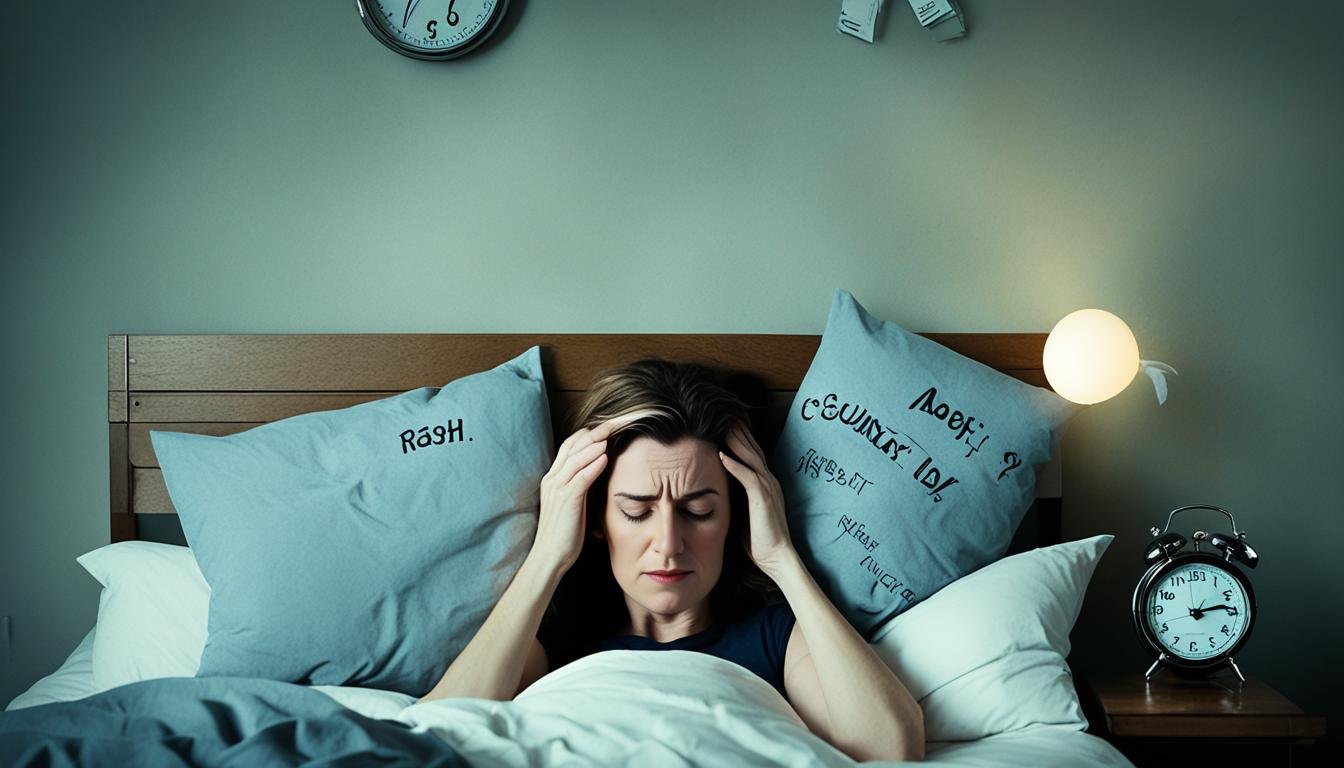
Your point of view caught my eye and was very interesting. Thanks. I have a question for you.
Thanks for sharing. I read many of your blog posts, cool, your blog is very good.